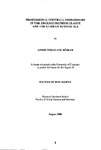Professional football sponsorship in the English Premier League and the German Bundesliga
| dc.contributor.author | Bühler, André Wolfgang | |
| dc.contributor.other | Plymouth Business School | en_US |
| dc.date.accessioned | 2013-10-03T12:16:35Z | |
| dc.date.available | 2013-10-03T12:16:35Z | |
| dc.date.issued | 2006 | |
| dc.identifier | NOT AVAILABLE | en_US |
| dc.identifier.uri | http://hdl.handle.net/10026.1/2004 | |
| dc.description | Merged with duplicate record 10026.1/704 on 10.04.2017 by CS (TIS) | |
| dc.description.abstract |
This research project looks at professional football sponsorship from three different perspectives: the clubs' perspective (sponsorship as an income stream for professional football clubs), the sponsors' perspective (sponsorship as a marketing tool for companies), and a joint perspective (sponsorship as an inter-organisational relationship between professional football clubs and their sponsors). The English Premier League and the German Bundesliga serve as the subject of research owing to their extraordinarily sound reputation in commercial terms. A combination of qualitative and quantitative research methods was used in order to answer the research questions which derived from an extensive literature review. First, qualitative in-depth interviews with representatives of English Premier League and German Bundesliga clubs and their sponsors as well as sponsorship experts were carried out in order to gain a broader understanding of the phenomenon under scrutiny. Consequently, seven principal research propositions and six hypotheses were formulated relating to the size of the football business, the importance of sponsorship as an income stream, motives and objectives of sponsors, and the importance and dimensions of relationship quality. Then, two content analyses were carried out (including an analysis of more than 500 clubs' and sponsors' websites and 106 televised football games) in order to identify as many football sponsors of English Premier League and German Bundesliga clubs as possible. The research propositions were then tested in a quantitative survey incorporating all English Premier League and German Bundesliga clubs as well as 460 sponsors. Parametric as well as non-parametric tests were applied at this stage. The findings of the research partially confirmed previous studies. More importantly, new insights have been uncovered. For example, new dimensions of relationship quality in the context of professional football sponsorship have been identified. This study therefore has both theoretical and practical implications for professional football clubs, sponsoring companies and prospective researchers in the field of (professional) football sponsorship. The study also contributes significantly to existing knowledge about the football business, sponsorship and relationship marketing. | en_US |
| dc.language.iso | en | en_US |
| dc.publisher | University of Plymouth | en_US |
| dc.title | Professional football sponsorship in the English Premier League and the German Bundesliga | en_US |
| dc.type | Thesis | |
| plymouth.version | Full version | en_US |
| dc.identifier.doi | http://dx.doi.org/10.24382/1567 | |
| dc.identifier.doi | http://dx.doi.org/10.24382/1567 |
Files in this item
This item appears in the following Collection(s)
-
01 Research Theses Main Collection
Research Theses Main


